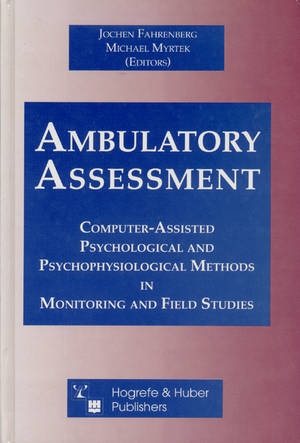Fahrenberg, J; Myrtek, M; University of Freiburg, Germany (Editors)
Ambulatory Assessment Computer-assisted psychological and psychophysiological methods in monitoring and field studies

This is the first book to appear on the topic of Ambulatory Assessment, a new approach to behavioral and psychophysiological assessment. The ambulatory assessment approach is based on “naturalistic” observations and measurements made during everyday life, and has high ecological validity. This also means that ambulatory assessment techniques are ideally suited for practical application in a wide range of fields. Individual differences in behavior and physiology, as well as behavior disorders, can be investigated in real-life situations, where the relevant behavior can be studied much more effectively than in the artificial environment of the laboratory. In this book, 24 chapters from an international group of researchers provide a comprehensive overview of the state-of-the-art in ambulatory assessment. The most recently developed methodologies are examined. Their use is then illustrated with numerous examples of monitoring and assessment, both in the workplace and with patients, and including the pertinent hard- and software components. Important research findings, some of which challenge theoretical positions that were based on laboratory observation, are also presented.
The essential objectives of ambulatory assessment, which are covered in this volume include: * Recording of relevant data in natural settings * Real-time measurement of behavioral and physiological changes * Interactive real-time assessment by automatically prompting the subject to respond to questions or instructions * Real-time assessment and feedback by reporting physiological changes to subjects — either with or without informing them as to which changes actually occurred * Concurrent assessment of psychological and physiological changes (events, episodes) * Correlation and contingency (symptom-context) analysis across systemic levels as suggested in triple-response models (multimodal assessment) * Ecological validity of results and suitability for direct applications. The wealth of practical know-how, as well as the theoretical background, contained in Ambulatory Assessment allow readers to keep up with the latest advances, and to learn how ambulatory assessment can best be applied. It will be of specific interest for those interested in psychology research and its practical applications (especially differential, clinical, and applied psychology), for psychophysiologists, for ergonomics/human factors specialists, and for medical personnel (cardiology, management of hypertension, psychosomatics, psychiatry). Contents: * Introduction * Ambulatory assessment: Issues and perspectives * The naturalistic approach in differential psychology * New Methodologies * Assessment of experience, activation, and cognitive performance related to the time of the day, setting, and situational consistencies * A computer-assisted self-monitoring procedure for assessing stress-related behavior under real-life conditions * Computer-assisted interaction diary on social networks, social support, and interpersonal stress * Computer-assisted vs paper & pencil-based self-monitoring * Temporal analysis of speech patterns in the real world using LOGOPORT * Interactive monitoring and contingency analysis of emotionally induced ECG changes * Field trials of an interactive ambulatory heart rate monitor * Ambulatory assessment of parasympathetic/sympathetic balance by impedance cardiography * Concurrent assessment of blood pressure, heart rate, activity, subjective state, and free commentaries on important episodes in everyday life * Continuous assessment of finger blood pressure and other hemodynamic and behavioral variables in everyday life * Towards a comprehensive technology for the recording and analysis of multiple physiological parameters within their behavioral and environmental context * Laboratory-field studies for improvement of ambulatory monitoring methodology * Strategies and designs in ambulatory assessment * Monitoring and Assessment in the Workplace * Psychophysiological analysis of work strain and action-oriented patterns of coping * Validation studies of emotional, mental, and physical strain components in the field * Psychophysiological analysis of the stress-strain processes under different break schedules during computer work * Monitoring and Assessment of Patients * Ambulatory assessment of clinical anxiety * Psychophysiological monitoring of transient ischemic episodes in patients with coronary heart disease * Ambulatory blood pressure monitoring * Ambulatory monitoring of sleep apnea * Ambulatory assessment of subjective and objective symptoms of diabetic patients * Signal-contingent computer diary for the assessment of psychological precedents of migraine attacks 1996 / 432 pages / hardcover / ISBN 0-88937-167-9 US $49.50 / CAN $67.00 / L 24.75 / DM 69.00 / Sfr 66.00 / E 35.28
